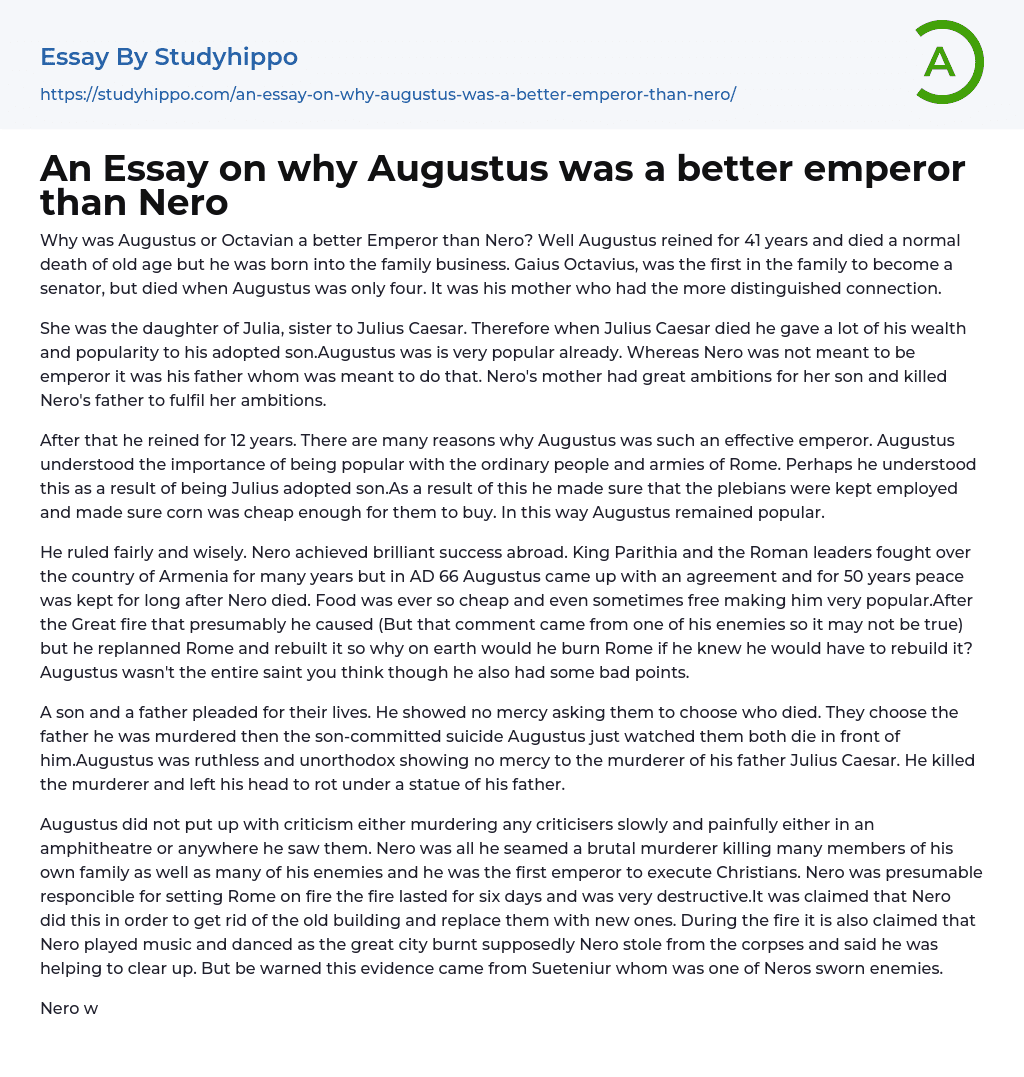It can be concluded that Augustus was a superior Emperor compared to Nero. This is due to his 41-year reign and natural death from old age. Additionally, Augustus came from a powerful family, although his father died when he was young, while his mother had significant societal connections.
Being Julia's daughter and Julius Caesar's niece, this woman inherited a significant amount of wealth and popularity after her uncle's death and its related inheritance. Augustus, who was already highly favored, benefited from these circumstances. Unlike Nero, who was not originally slated for the position of emperor as his father was destined for it. However, Nero's mother had aspirations for her son's future and committed patricide to advance her ambitions.
Reigning for 12 years, Augustus proved to be a highly effective emperor due to various factors. Notably, he recognized the significance
...of maintaining popularity among Rome's ordinary people and military forces, which could be attributed to his status as Julius' adopted son. To achieve this, Augustus ensured that plebeians were provided with employment opportunities and access to affordable corn, thus securing his continued popularity.
Despite claims from some of Nero's detractors that he may have been responsible for the Great Fire of Rome, he demonstrated wise and fair leadership during his reign. Nero achieved notable success abroad, particularly in achieving a peace agreement between King Parithia and Roman leaders that kept the peace for 50 years after his death. Additionally, Nero's popularity was boosted by his efforts to make food affordable, and even free at times. Furthermore, despite the accusations made against him regarding the Great Fire, Nero's rebuilding and planning of Rome suggests that he had no incentive
to cause such a disaster. Nevertheless, it is important to note that Augustus – like any historical figure – had both positive and negative qualities.
Augustus displayed no mercy towards Julius Caesar's murderer, as he acted in an unorthodox and ruthless manner. When the son and father begged for their lives, Augustus forced them to select who would die. The father was chosen and killed while the son committed suicide under Augustus's watchful gaze. To further demonstrate his ruthlessness, Augustus left the murderer's head to decay beneath a statue of Julius Caesar.
Augustus and Nero were both notorious for their cruelty. Augustus would execute anyone who criticized him, regardless of where they spoke out, while Nero was responsible for the persecution of Christians and executed members of his own family and enemies. It is believed that Nero intentionally started a fire in Rome which lasted six days, supposedly to replace old buildings with new ones. During this time, he played music and danced while allegedly stealing from corpses and claiming to assist with cleanup efforts. However, it's important to consider that these accounts come from Suetonius, one of Nero's enemies.
While Augustus utilized covert methods such as offering additional salary and inexpensive grain to officials, Nero's violent nature was widely recognized. This was exemplified by his execution of his initial spouse and the savage kicking death of his second wife. Nero went even further by arranging for the murder of his own mother and joking about it during an execution. Additionally, Nero was infamous for demanding rewards for chariot races that he neither won nor completed.
On the contrary, Augustus maintained peace and order. The wealthy Romans opted
to comply with Augustus' commands rather than protest, demonstrating Augustus' superiority as emperor.




